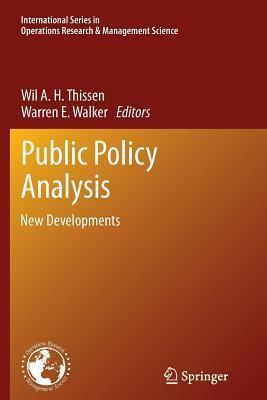Public Policy Analysis: New Developments

Public Policy Analysis: New Developments
Traditional policy analysis approaches are characterized by a focus on system modeling and choosing among policy alternatives. While successful in many cases, this approach has been increasingly criticized for being technocratic and ignoring the behavioral and political dimensions of most policy processes. In recent decades, increased awareness of the multi-actor, multiple perspective, and poly-centric character of many policy processes has led to the development of a variety of different perspectives on the styles and roles of policy analysis, and to new analytical tools and approaches - for example, argumentative approaches, participative policy analysis, and negotiation support. As a result, the field has become multi-faceted and somewhat fragmented.
Public Policy Analysis: New Developments acknowledges the variety of approaches and provides a synthesis of the traditional and new approaches to policy analysis. It provides an overview and typology of different types of policy analytic activities, characterizing them according to differences in character and leading values, and linking them to a variety of theoretical notions on policymaking. Thereby, it provides assistance to both end users and analysts in choosing an appropriate approach given a specific policy situation. By broadening the traditional approach and methods to include the analysis of actors and actor networks related to the policy issue at hand, it deepens the state of the art in certain areas. While the main focus of the book is on the cognitive dimensions of policy analysis, it also links the policy analysis process to the policymaking process, showing how to identify and involve all relevant stakeholders in the process, and how to create favorable conditions for use of the results of policy analytic efforts by the policy actors.
The book has as its major objective to describe the state-of-the-art and the latest developments in ex-ante policy analysis. It is divided into two parts. Part I explores and structures policy analysis developments, the development and description of approaches to diagnose policy situations, design policy analytic efforts, and policy process conditions. Part II focuses on recent developments regarding models and modeling for policy analysis, placing modeling approaches in the context of the variety of conditions and approaches elaborated in Part I.
PRP: 1022.91 Lei
Acesta este Pretul Recomandat de Producator. Pretul de vanzare al produsului este afisat mai jos.
920.62Lei
920.62Lei
1022.91 LeiLivrare in 2-4 saptamani
Descrierea produsului
Traditional policy analysis approaches are characterized by a focus on system modeling and choosing among policy alternatives. While successful in many cases, this approach has been increasingly criticized for being technocratic and ignoring the behavioral and political dimensions of most policy processes. In recent decades, increased awareness of the multi-actor, multiple perspective, and poly-centric character of many policy processes has led to the development of a variety of different perspectives on the styles and roles of policy analysis, and to new analytical tools and approaches - for example, argumentative approaches, participative policy analysis, and negotiation support. As a result, the field has become multi-faceted and somewhat fragmented.
Public Policy Analysis: New Developments acknowledges the variety of approaches and provides a synthesis of the traditional and new approaches to policy analysis. It provides an overview and typology of different types of policy analytic activities, characterizing them according to differences in character and leading values, and linking them to a variety of theoretical notions on policymaking. Thereby, it provides assistance to both end users and analysts in choosing an appropriate approach given a specific policy situation. By broadening the traditional approach and methods to include the analysis of actors and actor networks related to the policy issue at hand, it deepens the state of the art in certain areas. While the main focus of the book is on the cognitive dimensions of policy analysis, it also links the policy analysis process to the policymaking process, showing how to identify and involve all relevant stakeholders in the process, and how to create favorable conditions for use of the results of policy analytic efforts by the policy actors.
The book has as its major objective to describe the state-of-the-art and the latest developments in ex-ante policy analysis. It is divided into two parts. Part I explores and structures policy analysis developments, the development and description of approaches to diagnose policy situations, design policy analytic efforts, and policy process conditions. Part II focuses on recent developments regarding models and modeling for policy analysis, placing modeling approaches in the context of the variety of conditions and approaches elaborated in Part I.
Detaliile produsului








